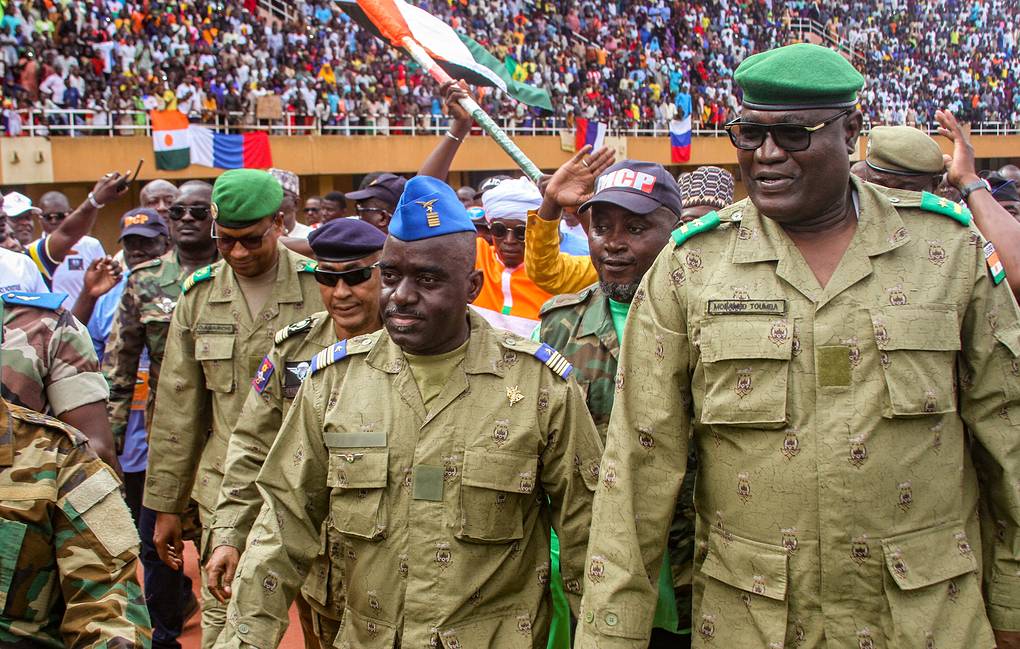PRETORIA, August 7. /TASS/. Tensions are becoming increasingly clear on the border between Nigeria and Niger following the expiration last midnight of the ultimatum issued by the Economic Community of West African States (ECOWAS) to the rebels who seized power in Niger on July 26. The participants in the ECOWAS summit on July 30 demanded the restoration of civilian rule in Niger within a week and the return of power to ousted President Mohamed Bazoum.
Distrust between the military
Correspondents of Nigeria's Daily Trust newspaper report no armed incidents from the border zone in Sokoto, Borno, Katsina and Jigawa states. However, the newspaper emphasizes, millions of people there are facing a hike in the prices of food and medications. They do not know what will happen tomorrow. In Borno, the military on both sides are feeling soaring distrust towards each other. Residents of the Malam Fatori locality in the north of Borno state and soldiers of the Nigerian military's detachment stationed there, whose task is to fight against Boko Haram terrorists complain that they are no longer allowed into Bosso, a locality two kilometers away in Niger's territory, where they have routinely purchased food and other essentials for more than 10 years.
According to the newspaper's source in the Nigerian security forces, the Nigerien soldiers have withdrawn from the joint force with Nigeria that fights against Boko Haram militants, who often make hit-and-run raids on both sides of the border. In the past, there were friendly contacts every day, but recent events have set the Nigerien military and even civilians from Bosso against the Nigerian detachment. And now neither the Nigerian military nor civilians from Nigeria are allowed there, so people in Bosso have to be asked to buy food for the contingent. Supplies have to be air airlifted from Maiduguri, the administrative center of Borno State, 200 km away.
Calls for peace settlement
People on both sides of the Niger-Nigeria border, most of whom are members of the Hausa people, have called on the ECOWAS leaders to reconsider their stance and drop the idea of resolving the Niger conflict militarily. A Muslim organization, Jama'atu Nasril Islam, has appreciated the Nigerian government for its efforts to engage in a dialogue to resolve the crisis in Niger.
On Sunday evening, Nigerian President Bola Tinubu met with the governors of border states bordering Niger: Ahmed Aliu (Sokoto), Umar Namadi (Jigawa), Mai Mala-Buni (Yobe), Nasir Idris (Kebbi) and Dikko Radda (Katsina). The outcome of the meeting is yet to be made public.
The newspaper notes that there are about 300,000 refugees from Nigeria in Niger, 37,000 of whom fled Boko Haram raids. They are now in a dire situation, as they cannot receive assistance from the Nigerian authorities.
The situation in Niger
On July 26, a mutinous group of Niger's military announced on television the removal of Mohamed Bazoum as president, the closure of the country's borders, the imposition of a curfew, the suspension of the Constitution, and a ban on the activity of political parties. On July 28, the rebels reported that General Abdurahman Tchiani, who led the presidential guard at the time of the coup and whose units detained and continue to hold Bazoum and his family at his residence under house arrest, became the head of state. The president, according to Nigerian politicians, is "in good health" and is on the phone with the leaders and government representatives of other countries, but he is not allowed to leave his residence. Bazum's supporters claim that the conditions of his detention have been tightened, with the electricity and water supply to his residence allegedly cut off.
At an emergency summit held on July 30, ECOWAS leaders demanded that the rebels who seized power in Niger immediately release and reinstate President Mohamed Bazoum and restore constitutional order in the country. The Community threatened to take action against the rebels and did not rule out the "use of force".
A plan was proposed to deploy troops to Niger. Nigerian President Bola Tinubu sought the Senate's authorization to use the army outside the country, but the senators favored a political settlement.
The ECOWAS military leadership said it had abandoned the use-of-force scenario against Niger. In doing so, the community will increase sanction pressure.
The rebels, in turn, said they were ready to respond to aggression or attempted aggression by ECOWAS.
